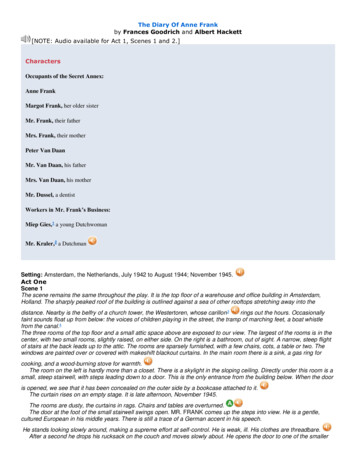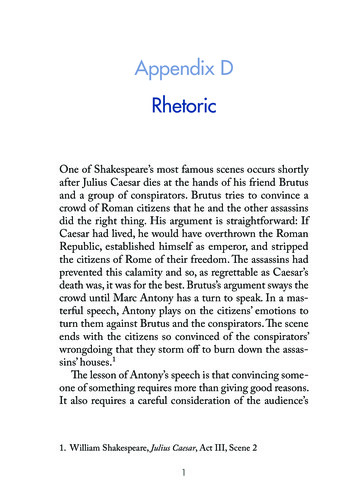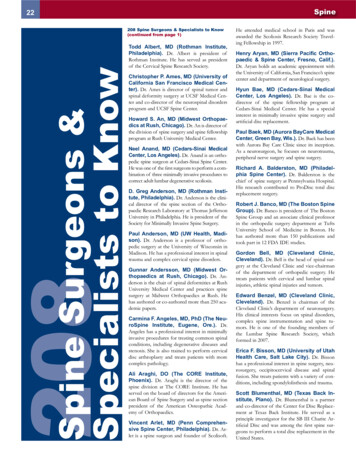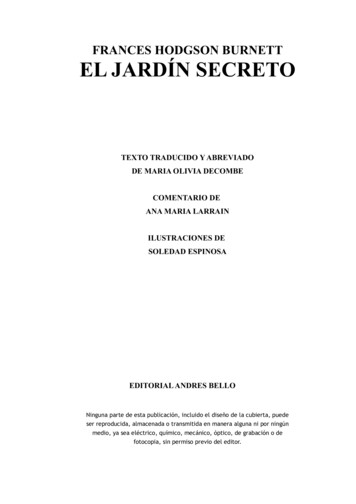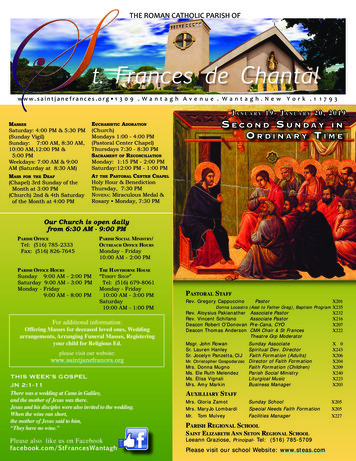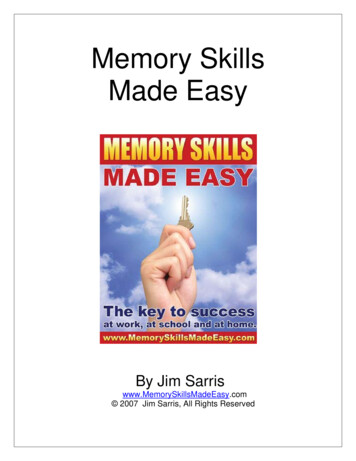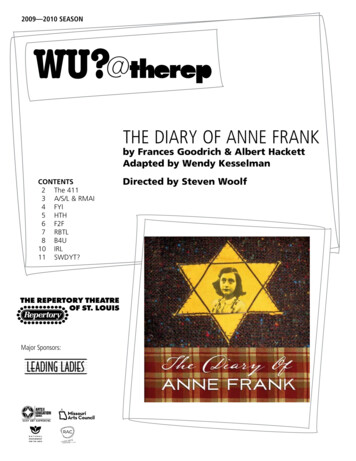
Transcription
2009—2010 SEASONthe diary of anne frankby Frances Goodrich & Albert HackettAdapted by Wendy KesselmanCONTENTS2 The 4113 A/S/L & RMAI4 FYI5 HTH6 F2F7 RBTL8 B4U10 IRL11 SWDYT?Major Sponsors:Directed by Steven Woolf
At The Rep, we knowthat life moves fast—okay, really fast.But we also knowthat some thingsare worth slowingdown for. We believe that live theatre is one ofthose pit stops worth making and are excited that you aregoing to stop by for a show. To help you get the most bangfor your buck, we have put together WU? @ THE REP—anIM guide that will give you everything you need to know toget at the top of your theatergoing game—fast. You’ll findcharacter descriptions (A/S/L), a plot summary (FYI),biographical information (F2F), historical context (B4U),and other bits and pieces (HTH). Most importantly, we’llhave some ideas about what this all means IRL, anyway.WELCOME!The desire to learn, insatiable when awakened, cansometimes lie dormant until touched by the right teacher orthe right experience. We at The Rep are grateful to have theopportunity to play a role supporting you as you awaken thedesire for learning in your students.Though Anne Frank died in Bergen-Belsen in 1945, so manyyoung people have met her through the book, play andmovie based on her diaries. And in meeting Anne, they havemet a part of themselves. Through Anne’s observations, thisPulitzer Prize-winning play paints a picture of the darkestof times and a world gone mad. But it also tells a story of ayoung girl’s hopes, dreams and awakening desires. In Anne’sre-written introduction to her diary she wished for a truestfriend in whom she could confide her deepest thoughtsand share her deepest feelings. Perhaps, with our help, yourstudents will become that true, dear friend.It would be a good idea to take a minute on the bus to giveyour students these quick theatre etiquette reminders:The Teacher’sLoungeIn an effort to make oureducational materials moreaccessible to students and easier for educators to incorporate into the classroom, our study guide is written in a student-orientedformat. We hope that you will circulate this guide amongyour students in the weeks preceding your visit to TheRep, encouraging them to browse it before and after classand as time allows, using it as a launch point for both preand post-performance discussions. You may also want tovisit our website, www.repstl.org, for additionalinformation including educational games, activitysuggestions and behind-the-scenes information. Anymaterials, either from this guide or from our website maybe reproduced for use in the classroom. As always, weappreciate your making live theatre apart of your classroom experienceand welcome your feedbackand questions.Show Me Standards: CA 2, 3, 7; FA 2, 3, 4, 5; SS 2, 4, 6and Illinois Learning Standards: 1, 5, 16, 18, 25, 27. This show has an intermission; there will be time forbathroom breaks before the show and partway through. The actors can hear the audience and appreciate thelaughter, gasps and quiet attention to action. However,talking, moving around and eating is very distractingto others and can dampen the energy of what ishappening on stage. Pictures, phone calls and texting are not allowed at anytime during the performance.Live theatre won’t allow your students to take a passiverole—they must work with us to create the experience whichtakes the learning deeper. Our unique ability to fuse wordsand images onstage allows your students to explore newideas as well as excites their imaginations. We will do ourpart so your students will be stirred to understandings andself-awareness while delving into new and familiar worlds.You are doing your part by using The Rep to extend yourintellectual and aesthetic curriculum. Thank you!Marsha Coplon, Director of Education
Always bubbly and bright, ANNE FRANKis a young lady with a flair for the dramatic(and for inspiring those around her).Her diary offers a peek inside the Jewishexperience in Europe during the horrors ofthe Holocaust.over her mother quite noticeably, a fact thatdeeply hurts her mother.Despite all of her efforts, EDITH FRANK(Anne and Margot’s mother) can’t seem towin over even an ounce of Anne’s affection.MR. and MRS. VAN DAAN (Peter’sparents) don’t always get along perfectlywith the Franks, but they do their bestto contribute around the house throughcooking and not getting too irritated withAnne’s antics.MARGOT FRANK is Anne’s “goody twoshoes” older sister. Because she takes all theright steps she doesn’t always get the sameamount of attention as her more dramaticlittle sister, but that seems to be okay withMargot.A late addition to the annex, ALFREDDUSSEL is a dentist with a sensitiveThough he’s a few years older than Anne,PETER VAN DAAN draws Anne’s eyeand receives much of her attention eventhough he may not always want it.stomach and and a short fuse.As the occupants only connection to theoutside, MIEP and MR. KRAlER are eversupportive to the families on their regularvisits to the annex. Without these two, allwould certainly be lostThrough all the turmoil, OTTO FRANK (thefather of Anne and Margot) is the voice ofreason and compassion. Anne favors OttoREAD MORE ABOUT ITWe encourage you to explore the following books, movies andwebsites for more information.Frank, Anne. The Diaryof a Young Girl. Bantam.1993. Having seen theplay, are you curious aboutAnne’s actual diary? Get thefull story of what happenedin the annex, direct from theauthority, Anne Frank herself!Bovsun, Mara and Zullo,Allan. Survivors: True Storiesof Children in the Holocaust.Scholastic Paperbacks, 2005.Want more of a kid’s perspectiveon the Holocaust? Check out thisbook which follows nine youngchildren as they struggle tosurvive the difficult times.The Diary of Anne Frank,180 minutes, 20th CenturyFox, 2004. See the original filmadaptation of the stage playfrom 1959, starring Millie Perkinsand Shelley Winters.Schindler’s List, 195 minutes,Universal Studios, 2004. Nocinematic study of the Holocaustwould be complete withoutwatching this Steven Spielbergmasterpiece. Because it’s rated R,make sure you check with yourparents before watching!3http://www.ushmm.org/Check out the United StatesHolocaust Memorial Museum forinformation, links and more!http://www.annefrank.org/Curious about Anne Frankherself? Check out the websiteof the museum dedicated solelyto her!
As the play begins, the Franks (Otto,With tensions already high and patienceEdith, Margot and Anne) huddle together intheir new home, a crowded but concealedsecret annex in Otto’s office building. Thingshave gotten rough for the Jews of late, asmany have been deported or “called-up” towork camps. Since Margot recently receivedsuch a call-up, the Frank family knew it wastime to go into hiding. Meeting them in theirhiding spot is another Jewish family, the vanDaans (Mr. and Mrs. van Daan and their sonPeter).wearing thin, Miep and Mr. Kraler bring badnews on one of their regular visits—thingsare only getting worse in the world outside.There is another Jew who needs a safehaven, a dentist named Alfred Dussel. Thefamilies are torn over whether they cancontinue in the annex with another personto cramp them further and require theirfood. Otto’s voice of reason prevails, however,and they take the dentist in.Before the Franks and van Daansare settled, their friends on the outside(Miep and Mr. Kraler) let them know theywill taking care of the families duringtheir hiding. They will bring them all thenecessities like food and water while alsobringing them news from the outside and,when they are able, little luxuries like librarybooks.Upon his arrival, Dussel confirms thatthings aren’t getting better on the outside.The Jews are disappearing from everywhere,often in the blink of an eye and with littlewarning. Families are being picked apart asthe Jewish community seems to be vanishingentirely.so much to protect the Franks and thevan Daans, as the families must take itupon themselves to be completely silentthroughout the workday. There are manyworkers in the office below, and if anyone inthe annex makes even a peep, all could belost.Though Hanukkah brings a briefmoment of hope, it also brings the perilof nearly being found out. A loud noisein the office below silences the families’celebration. As the bookshelf that concealsthe door to the annex is rattled, their fateseems sealed—surely the police have cometo get them. All are able to breathe a sigh ofrelief, however, as they find out that it wasjust a burglar and as quickly as the threatappeared, it is gone and they are safe.Though the families do their best toAs the days pass, things seem to onlybe civil to one another, the cramped quartersand differences of opinion sometimes getthe best of them. Though she has goodintentions, Anne seems to be a consistentsource of conflict in the annex, as hertendency to be melodramatic isn’t alwaysunderstood by the adults (or Peter for thatmatter, who seems to get a lot of unwantedattention from her). Ever understanding,Otto recognizes Anne’s struggle with thesituation and her adolescence, and heencourages Anne to remain positive andexplore the world in her diary writing.get worse, both inside and outside theannex. Sickness, hunger and fear drive theoccupants nearly mad until finally newscomes of the liberation. The Allied forces areon the offensive, taking out the Nazis andfreeing the Jews. It seems now that it’s onlya matter of time before the families are tobe freed, a time that seems so close. As theycelebrate that night, however, their hidingplace is found by the police and they aretaken away.But Miep and Mr. Kraler can only do
Lyceum: a literary institution, lecture hall,Rucksack: a bag with shoulder strapsteaching place.that allow it to be carried on someone’sback, typically made of a strong, waterproofmaterial and widely used by hikers.Green Police: originally known inGermany as the Ordunungspolizei (whichtranslates roughly to “Order Police”), theGreen Police get their name from theiruniform color. They served as one of thelargest components of the Holocaust, as themanpower for apprehension, deportationand other victimization of those deemedunacceptable to the Nazi regime.Latkes: a kind of pancake made withgrated potato, traditionally served atHanukkah.Intimate: closely acquainted, familiar,close.Kale: a hardy cabbage of a variety thatproduces erect stems with large leaves andno compact head.Branded: marked, typically as somethingbad or shameful.Guilders: the basic monetary unit of theDeported: expelled from a country,Netherlands (until the introduction of theEuro), equal to 100 cents.typically on the grounds of illegal status orfor having committed a crime.Annex: a building joined to or associatedwith a main building, providing additionalspace or accommodations.Quicksilver: deriving from the liquidmetal mercury, used to describe somethingthat moves or changes very quickly, orsomething that is difficult to hold orcontain.Ravenous: extremely hungry.Sauerbraten: a dish of German originDignified: having or showing a composedor serious manner that is worthy of respect.consisting of beef that is marinated invinegar with peppercorns, onions and otherseasonings before cooking.Throng: a large, densely packed crowd ofpeople or animals.5
So you know that the play The DiaryThough both Frances and Albert endedof Anne Frank is based on the actual diariesthat Anne Frank wrote while in hidingduring the Holocaust, right? DUH! But whowrote the actual play? Her father? WilliamShakespeare?up primarily as screenwriters, this dynamicduo actually started on different careerpaths. Albert was perhaps the more likelyof the two to end up in show business, asboth of his parents were actors. It was onlynatural for him to start out as a child actorfor both the stage and screen. He wouldappear in almost two dozen films beforefinally jumping ship and taking up the pen.if you guessed just any old dude then youcould be half right, but actually the playwas written by two writers, not one—thehusband-wife team of Frances Goodrich andAlbert Hackett.But how can two people write one play,you ask? While it’s true that writing tendsto be a solitary act, it’s actually not all thatuncommon in musicals, screenplays andtelevision for there to be multiple writers ofa single script. But how? Well, in musicalsone person usually writes the songs andlyrics while another might write the “book”(the talking while there’s no music). Inscreenplays, one person may write a draft ofa script and then another person “punches itup” (makes it sharper, funnier, more actionpacked) when they’re through. In television,different people might be in charge ofwriting the overarching storyline whileothers take care of the jokes.Frances, however, spent little of herlife prior to meeting Albert in the limelight.As a studious youngster Frances didn’tseem to have time for the stage, and aftergraduating from Vassar College in 1912 shewent on to pursue further training and acareer in social work. Almost immediatelyupon meeting Albert, however, her planschanged.Shortly after the two wed they wereblazing a trail to Hollywood. They wouldn’tspend long trying to break in, as their firstbig break came with The Thin Man in 1934.The project allowed them to develop andshowcase their ability to realistically portrayan honest, modern relationship (as opposedto the more stylized, censored posturingof the day). This new style of writing wasinnovative and led to lots of future work,and as the pair continued to refine theirstyle they also became known for their quickand clever dialogue.The pair continued writing well intotheir 90s, earning four Academy Awardnominations and five Writer’s Guild Awardsfor their screenplays, while earning aPulitzer Prize for Drama and a Tony Awardfor their play The Diary of Anne Frank. Theirbig screen hits include Seven Brides for SevenBrothers, The Thin Man and the Father of theBride series (both in the 1950s and the 1990sremakes).
growing upbelieve in yourselfAs if the drama of hiding during theHolocaust weren’t enough, Anne undergoesthe process of growing up right before ourvery eyes. The transition between childand young adult isn’t always a smoothone, as Anne demonstrates in her attemptsto navigate the series of physical andpsychological changes. There’s often a greatdeal of confusion and the tendency to bemelodramatic as we attempt to find ourown identity, but it’s important to keep inmind that the adults around us have beenthere before and it can sometimes helpto talk about what we’re feeling. How isyour world changing as you grow up? Whatthings or ideas have you left behind in yourtransition? What have you picked up alongyour journey?Throughout the play, Anne continuallyquestions whether or not she’s good enough.She seems jealous of Margot and the factthat she’s a “goody two-shoes.” She alsoquestions whether or not she has any talentas a writer. However, at the end of the day,she presses on and pursues what she loves,staying true to who she is. Anne teaches usthat no matter what anyone else says, if youpursue your dreams, you can succeed. Whatis important in your life that you wish topursue? Do you think you have a particulartalent for it? Have you been told so? Or haveyou been discouraged?standing for rightBesides being Jewish, all of the occupants inthe annex had one thing in common—theywere all heavily discriminated against. Theyfeared for their lives constantly, as anysiren or irregular noise outside the annexwas legitimate cause for concern. In a worldseemingly driven by discrimination againstthe Jews, there were two individuals whostood up and defended their friends—Miepand Mr. Kraler. As discrimination still existstoday, what can you do to help fight againstit? Have you ever stood up for someone whowas discriminated against?patience & acceptanceHave you ever felt sorry for yourself becauseyou had to share a room with your brother?Or because you didn’t have a Play Station 3?Maybe you felt like the world was plottingagainst you when you couldn’t go out andplay because you had too much homework?Just think—none of these things even holda candle to what the characters in the playhad to endure. Yet despite everything—thesmall space, the differences of personality,the lack of food, the inability to moveor speak during the day—they were justhappy to have one another and be alive.These characters remind us no matter howawful we think our lives may be, there’salways someone out there who has it worse.It’s our job in life to patiently accept ourcircumstances, and be thankful for what wehave. What do you have to be thankful for?Who do you have to be thankful for? Whatshould you complain about less?The BirdsNorth by Northwest
World War IIWhile the playdepicts the very realhorrors of what lifewas like for those inhiding, it only beginsto scratch the surfaceof the greater turmoilthat was taking placeoutside—World War II.Though WorldWar II may not have been the longestwar in human history (it ran from roughlySeptember 1939 to September 1945), it isconsidered the most deadly of conflicts in allof history, claiming over 60 million lives ornearly 4% of the world’s population in 1939.Perhaps even more disconcerting than thecasualty total is the fact that over half thecasualties—over 34 million—were civiliandeaths, not military. That means over 34million people not fighting in the war dieddirectly because of it.Though the Nazis are known as the majorbad guys in the conflict by most, the warpitted the Allied Powers (which included 18countries across Europe, Asia and even Northand South America) against the Axis Powers(which included Germany, Italy and Japan).Though all of the Allied Powers made theirown notable contributions, the “Big Three”of the Allies is usually considered to be theUnited States, Britain and the Union ofSoviet Socialist Republics (USSR).World War II was truly a war of theworld, not just in the number of countriesengaged but in the area spanned by battle.While it was fought mostly in Europe, Asiaand the Pacific, there were campaigns inthe Middle East and Africa, and one of themore pivotal strikes of the war took place inAmerica (Pearl Harbor). Virtually no countrywas left untouched by the time it was all saidand done.Scholars debatethe actual cause forthe war, but there area number of factorsthat seem to stem fromwithin Germany afterit lost World War I. Aspart of its punishment,Germany was under harsheconomic penalties (perthe Treaty of Versailles).Between heavy fines,disarmament (theyweren’t allowed to have military forces orweapons), loss of territory and the loomingeconomic depression, hunger and povertybecame widespread. The Germans longed fora strong, unifying force in the government,one that could redeem them from their lossand get the country back on its feet.Enter Adolph Hitler, a defeated soldierduring World War I with great civic prideand a plan for a German rebound. Though heand his Nazi party were dismissed early on,his ability to speak and move a crowd forcedpeople to take a second look at his ideas.He offered the German people somethingthey needed—a plan. In a time whereeveryone was pointing fingers and tryingto pin the blame on someone else, he gavethem scapegoats—the Jews and the Gypsies.Through his bullying, terrorism and politicalsavvy, Hitler rose to power on the platformthat Germany could be restored by cleansingitself of these “inferior peoples,” leavingbehind what he called “a superior Aryanrace.”While turmoil and excitement fed theNazi force within Germany, nations aroundit did little in response. Hilter’s power grewas he perpetuated fear amongst those whoopposed him, and when he struck (first withthe invasion of Poland in 1939) he seeminglycaught the world off guard. He had becomemore powerful than anyone had imagined,which made much of the war for the Alliesan attempt to catch up.
the holocaustclearly who was the enemy and who wasnot.From around 1933 to 1945 (extendingFrom there, the Jews would be takenfrom their homes and forced to livein ghettos, further separating out thepopulation. These ghettos were consideredholding places for Jews before they were tobe called to concentration and labor camps,though many would perish before everleaving. Overcrowded and impoverished, theghettos were breeding grounds for lethaldiseases. And where sickness didn’t prevail,hunger usually took over.beyond the time period of World War II)some of the darkest and deadliest eventsin all of human history took place withinGermany and across Europe. Individuals wereripped from their homes, tortured, deportedand even killed simply because of theirethnicity and religion. Children lost theirparents, parents lost their children, andmany more lost everything they had. Thesehorrific events have become known as theHolocaust.Those who were called to concentrationor labor camps were sent (further yet fromthe general population) to be workedto exhaustion, tortured or simply killed(sometimes all three). As the Holocaust woreon, the camps came to employ gas chambersthat could kill up to a thousand peoplewithin 20 minutes.Over the 12-year period of the Holocaust,Hitler and the Nazis were attempting acomplete genocide (killing an entire peoplebased upon their ethnic group or countryof origin) of the Jews. Frighteningly, theyalmost succeeded, as they wiped out aroundsix million people—2/3 of the EuropeanJewish population.When the Nazis invaded countries likePoland and the Soviet Union, they employedless discrete methods of extermination.Upon invasion they would round up all theJews they could find and simply executethem all by shooting them. Worse still, whenammunition was low, the Nazis would burythe Jews alive.Hitler justified these horrors throughbrilliant rhetoric (language designed tohave a persuasive or impressive effect onits audience, though often regarded aslacking in sincerity or meaningful content),offering up the Jews as scapegoats for allof Germany’s problems. He called them“ethnically inferior,” portraying the Jews asgreedy and having schemes to destroy theGermans. Jews secretly plotted to rule theworld, Hitler argued, a world in which thegood, common, decent German would suffer.According to the Nazis, the only way toreclaim German glory was to exterminate theproblem—the Jews.Toward the end of WWII and evenafter its official end, the Nazis marchedtheir prisoners to death (a tactic known asdeath marches). No matter how harsh theconditions or how far the distance, Jewswere forced to march until they couldn’tmarch any longer. Those who didn’t dieon the march had the grim fate of facingexecution or a concentration camp.the extermination of an entirepopulation would be no easy task, but Hitlerdevised a careful and complex plan thatbecame a highly efficient death machine.First, all Jews had to be distinguishedfrom the general population. This wasaccomplished by forcing them to wear yellowstars. These yellow stars would proclaimWhile it is painful for us to look backon the atrocities of the Holocaust, it isimportant for us to recognize and learnabout the injustices that took place. It is ourresponsibility to acknowledge the wrongsdone and to make sure that these horrorsdon’t happen again.9
discriminationThe play The Diary of Anne Frank bringsto light one of the ugliest aspects ofsociety—discrimination. Discrimination isthe unjust treatment of different peoplebased upon race, age, gender or sexualorientation. Though there may not be anymass exterminations taking place in Americatoday, there other forms of discrimination,perhaps more subtle, that plague our world.Among the most prominent andstaggering forms of discrimination is thatbased upon gender. Women in today’ssociety have less opportunity and holdfewer positions of influence than their maleequivalents. For example, 95% of seniorlevel managers in the world’s top companiesare men, despite the fact that over half ofall master’s degrees are awarded to women.The barrier that women face (or the level atwhich women cannot seem to be promotedpast) is often called the glass ceiling.The glass ceiling doesn’t just effectwomen, however. Ethnic minorities likeBlacks, Asians, Hispanics and others alsosuffer from discrimination. Of the seniorlevel managers mentioned above, 97% werewhite. Repeated studies also reveal thatminorities and women have less earningpower than white males, or that they getpaid less for the same work.So how do we stop discrimination?First, we have to recognize where it begins—ignorance. Discrimination relies heavilyon misinformation and stereotypes—orattributing certain characteristics to anentire category of people. It’s like saying allwhite people have blond hair and blue eyes.While there are certainly white people whohave blond hair and blue eyes, these twocharacteristics do not define what it meansto be white, nor are they shared by all whitepeople.Secondly, there is a tendency tooversimplify the issue of discriminationby proclaiming “We’re all people, we’re allthe same!” While this may appear to be astep forward from actual discrimination,it doesn’t acknowledge or celebrate thedifferences between individuals. Just thinkhow boring lunch would be if we didn’t haveItalian food (pizza!), French food (fries!), orAncient Greek food (snow cones!). Diversityis indeed the spice of life, and studies haveshown that a diverse workplace is a hotbedfor innovative and exciting ideas, as eachindividual is encouraged to bring theirunique perspective to the plate. While we allmay be human and feel many of the samethings, don’t forget to celebrate what makesyou and others unique.Lastly, discrimination ends whenwe all make it our mission to practiceconsideration. We won’t always make theright decisions or say the right things, butwe can maximize what we do right by tryingto learn about those who seem different andby trying to be considerate of their views andbeliefs.] Have you ever faced or witnessed discrimination?What did you do?] How can we celebrate diversity instead ofdiscriminating against our fellow humans?
“Remember when we arrived—hownumb Margot and your mother were? Iwas a wreck with worry, but you youskipped around the room calling it ‘anadventure.’ You showed me you couldescape. Now when I read my Dickens,it takes me to another world. In thatworld, I feel safe. You have somethingtoo, Anne. A diary. You’ve found yourworld in there. You’re lucky.”] As Anne struggles to deal with beinglocked in hiding, Otto reminds her of thepower of imagination. For example, heenjoys reading books and allowing themto transport him to another world. Hereminds Anne of the power of her diary,and how with such an escape the rest ofthe world is much more bearable. Whatescapes do you have in your world?“Just as I was falling asleep, my friendHanneli appeared, dressed in rags, herface thin and worn. She looked at mewith such sadness in her eyes that Icould read the message in them: ‘OhAnne, why have you deserted me? Helpme, help me, rescue me from this hell!’If only I could. Why have I been chosento live, and she to die?”] At many points during her hiding, Annefeels overwhelmed with guilt because sheisn’t sure if her friend Hanneli is even stillalive. Anne feels a mix of sadness andguilt, wondering what caused her to be solucky and not her friend. Have you everfelt sad or guilty because someone aroundyou seemed less fortunate than you?Why do you think you felt guilty? Whatobligations do you have to those aroundyou who seem less fortunate?“The sun is shining, the sky a deep blue,there’s a magnificent breeze, and I’mlonging—so longing—for everything!I walk from room to room, breathethrough the crack in the window frame,feel my heart beating as if to say, ‘Can’tyou fulfill this longing at last?’ I longfor every boy, and to Peter I want toshout, ‘Say something, don’t just smileall the time, touch me, so I can get thatdelicious feeling inside.’ I feel springwithin me, I feel spring awakening, Ifeel it in my entire body and soul. I‘mutterly confused, don’t know what toread, to write, to do. I only know I amlonging.”] Though you may confuse this passage asAnne simply saying she’s stir-crazy fromhiding in the annex, Anne is actuallyexpressing the awakening of the youngadult who is beginning to blossom beforeus on stage. She expresses the mixbetween joy and confusion, the inabilityto know what’s next but the drive to findout. What does growing up mean to you?How do you feel? What are you lookingforward to? What will you miss? What’sconfusing to you?“I’d never turn away from who I am. Icouldn’t. Don’t you realize you’ll alwaysbe Jewish, Peter in your soul?”] In the face of the most horrificpersecution, Anne’s response to Peter andhis desire to “quit” being a Jew remindsus that we are obligated to remain trueto who we really are. We shouldn’t let anyamount of peer pressure, discriminationor otherwise convince us to do somethingwe don’t want to do or be something thatwe’re not. What in your life is importantto you? What do you need to remain trueto?
Frank, Anne. The Diary of a Young Girl. Bantam. 1993. having seen the play, are you curious about anne’s actual diary? Get the full story of what happened in the annex, direct from the authority, anne frank herself! Bovsun, Mara and Zullo, Allan. Survivors: True Stories o
